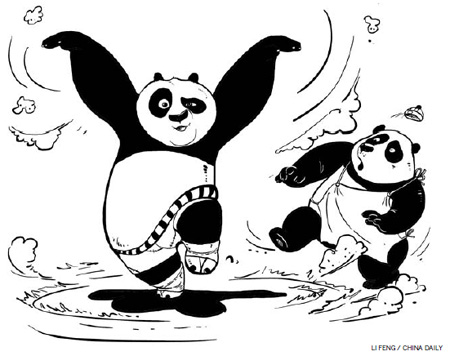Peace cannot be achieved unilaterally
- By Jin Liangxiang
 0 Comment(s)
0 Comment(s) Print
Print E-mail China.org.cn, February 24, 2013
E-mail China.org.cn, February 24, 2013

It is always a global concern whether China will adhere to its peaceful development road. The latest remark by CPC General Secretary Xi Jinping in late January kindled yet another round of discussions. Xi says that China will stick to its road of peaceful development, but will never give up its legitimate rights or sacrifice its national core interests.
His speech actually could be interpreted as the reflections of Chinese policy makers and scholars in response to the challenges the nation's peaceful development strategy now faces.
It is true that peace is a main ingredient of China's national character. Over the course of its extensive history, the country has been an agricultural society more prosperous than any of its neighboring nomadic communities and therefore has occasionally fallen victim to aggressions with the purpose of depriving wealth. Nevertheless, stability and peace have always been the common aspiration of both the ruling class and grassroots people.
China's option for the road of peaceful development is also the outcome of its interactions with other regional and global players. China's development has always been accompanied by either legitimate or illegitimate concerns from international voices.
The 1990s, as did the first ten years of the 21st century, witnessed various predictions about the prospects of China's development, among which two were especially worth mentioning.
The first is that China will grow to be a power threatening both the Asian region and the world. While the country's neighbors were worried that China might impose a regional order through economic and military means, the West was concerned whether or not China would lead the pack in upsetting the incumbent international system, which was basically founded on Western values.
The U.S., in particular, was anxious about the prospect that Beijing might challenge its global leadership position.
The second predicted China's collapse in the very near future. Gordon G. Chang, an editor, lawyer, author, and television pundit known for his rather antagonistic views towards China, actually gained fame by predicting China's collapse.
In 2001, Chang published his book "The Coming Collapse of China," predicting China's collapse in 2006. He argued that the hidden non-performing loans of the "Big Four" Chinese state banks would likely bring down China's financial system and its communist government and ultimately lead to the country's collapse in 2006.
In response to both abovementioned predictions, Chinese scholars headed by Zheng Bijian, then vice principal of the Central Party School, initiated the theoretical doctrine of the "peaceful rise" in 2003.
However, the two predictions were proven to be self-evidently wrong if only by the simple fact of China's growing to become the number two economy in the world by 2010, only after the U.S., and still maintaining sound ties with its neighbors and the world at large.
Zheng's term "peace" was in response to the proposed "threat," while "rise" stood in opposition to "collapse." Since the word "rise" could fuel perceptions that China posed a threat to the established world order, both Chinese officials and scholars later accepted the term "development." Thus, the doctrine of "peaceful development" finally came into being.
Though the concept of peaceful development was originally a theoretical reflection, it in many other ways signified a form of strategic assurance. China meant to assure other Asian nations and the U.S. that it, despite its growing military and economic strength, would not pose a threat to peace and stability, and that other nations would benefit from China's growing power and influence.
But it seems that the complexity of this new-found theory stretches far beyond the imagination of Chinese elites. China's commitment to peace should serve to construct favorable regional and global international relations. However, some of the neighboring countries, over the past few years in particular, have adopted a slightly more aggressive policy, leading to the occasional maritime conflicts in the South and East China Seas.
In addition, the U.S., which was expected to act as a mediator, actually integrated its policy regarding the conflicts between China and some of its neighbors as part of its strategy to re-balance against China, perhaps for the latter's growing influence in the region.
In the face of these challenges, Chinese elites have realized that a commitment to peace can be made unilaterally, but the peace itself cannot. Peace, as an outcome, can only become available via benign bilateral or multilateral interactions and cooperation instead of unilateral commitment.
While some international analysts would explain Xi's January remark as an outspoken deviation from China's peaceful development policy, it actually stands for a refreshment of the peaceful development strategy. It is quite predictable that China will consistently work for peace to protect the necessary stable environment for its domestic development.
On the other hand, Beijing well understands that any unilateral peace commitment will not necessarily be rewarded with peace; peace also depends on positive responses from other parties.
It is legitimate to set redline for the nation's peaceful development road, that is, its core national interests regarding its sovereignty over territory and territorial seas as one. The commitment to peaceful development should be honored as a guideline in building favorable international relations.
The author is a columnist with China.org.cn. For more information please visit http://www.shenbo75.com/opinion/jinliangxiang.htm
Opinion articles reflect the views of their authors, not necessarily those of China.org.cn.





